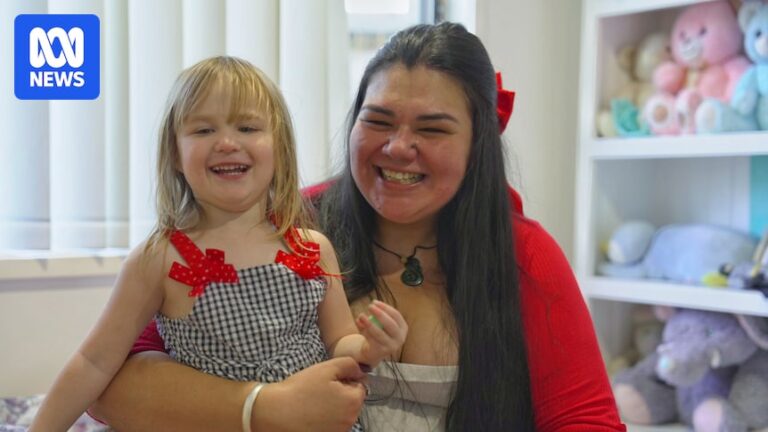Chloe Thompson feared she would never hear her children say “I love you”.
Her two sons and daughter – all aged under 10 – have level three autism.
Loading…
A breakthrough came when the Logan mum enrolled her middle child Delilah, 3, at an AEIOU centre – an early intervention service for kids with autism.
“Within a month of going there, she was saying ‘I love you, mum’,” Ms Thompson said.
Chloe Thompson’s children Elijah-Jay, Delilah and Zeke Miller have been diagnosed with autism. (ABC News: Lucas Hill)
“She went from a screaming, non-sleeping, non-verbal little girl to the exact opposite within three months.
“She probably has a vocabulary of 100 words now … she was scared of people, probably terrified of people but she engages with everyone now.”
Chloe Thompson says she has been told Delilah should attend mainstream kindy. (Supplied)
Ms Thompson has had her daughter’s National Disability Insurance Scheme (NDIS) plan reviewed twice, to try and get funding that she would use to send Delilah to AEIOU five days a week.
Both requests were denied.
“The NDIS told me she only needs one hour of therapy a week … they want her to go to mainstream kindy, we’ve tried that and it does not work,” she said.
“They were telling me what my daughter needs without ever meeting her.”
Delilah Miller’s mother says she has been refused NDIS funding that she would use to send her daughter to AEIOU full-time. (Supplied)
‘Rapid’ cuts to funding
Other families like Ms Thompson’s are also facing similar problems with NDIS funding, according to AEIOU.
Clinical manager Joanne Stephen said the service has been overwhelmed by reports from parents saying their NDIS payments have been slashed by up to 60 per cent when their plans were reviewed in recent months.
Joanne Stephen says many families with children at AEIOU have had their NDIS plans slashed in recent months. (ABC News: Lucas Hill)
She said some have had tens of thousands of dollars suddenly stripped from their plans.
“At least half of our families have been directly impacted,” Ms Stephen said.
“Their reviews have been rejected and unfortunately, these families have to exit our service or move to a part-time placement … against my own clinical recommendation.
The AEIOU Foundation is an early intervention service provider for children with autism. (ABC News: Lucas Hill)
“These cuts came at a very rapid pace, and we tried our best to advocate for the families by giving the NDIS additional evidence of why these children need to stay with us for a full-time placement but … we’ve had so many rejections from these review processes.
“It’s so sad and heartbreaking because I feel like my hands are tied,” she said.
Joanne Stephen says the cuts have seen some parents forced to consider handing their children over to state care because they can’t support them without specialised care. (ABC News: Lucas Hill)
Ms Stephen said the cuts have seen some parents, who are struggling with their mental health, forced to consider handing their children over to the state because they can’t support them without specialised care and therapy.
“We tried our best to help them with the review process, but some of these children are displaying behaviours of concern at a point that the families feel they can no longer support or manage them in a home environment.”
In a statement, a spokesperson for the National Disability Insurance Agency (NDIA), which runs the NDIS, denied there have been any cuts.
“The NDIA is not systematically reducing funding for therapy supports in children’s plans,” the spokesperson said.
“NDIS plans may go up or down over time – that is how the scheme was designed.
“The NDIS does not fund programs or providers; it provides funding to individuals based on their specific needs.”
Parents ‘in battle’ with the NDIS
Autism Queensland Chief Operating Officer Frances Scodellaro said specialised early childhood support was “critical” for an autistic child’s wellbeing and development.
However, she said a rising number of families were reporting receiving an insufficient amount of NDIS funding to meet their child’s needs.
“We’re seeing children waiting a lot longer to get their initial NDIS plan and the funding that comes with the plan,” Ms Scodellaro said.
“We’re also seeing situations where they get that plan, but then the funding is not sufficient to fund the support that’s needed so that’s even more waiting.”
Frances Scodellaro says for some the funding approved is not sufficient to meet the children’s needs. (ABC News: Lucas Hill)
She said “increased transparency” from the NDIS in how decisions were made was needed.
“Parents are telling us they’re feeling like they’re having to go into battle with the NDIS … for some, they’re getting to the point where they’re saying ‘I don’t feel like I can keep going with this battle’,” she said.
Delilah Miller is attending an early intervention service for kids with autism. (Supplied)
Ms Stephen called for the NDIS to “consider each individual child and their families.”
“If a child needs an intensive service because they’ve tried everything else, then we have to acknowledge that and recognise that perhaps they do need funding to access a service like ours,” she said.
The NDIA spokesperson said funding decisions were always “communicated to NDIS participants, including the reasons for those changes.”
“The agency recognises the individualised needs of every participant.”
This article was originally published by a www.abc.net.au . Read the Original article here. .



